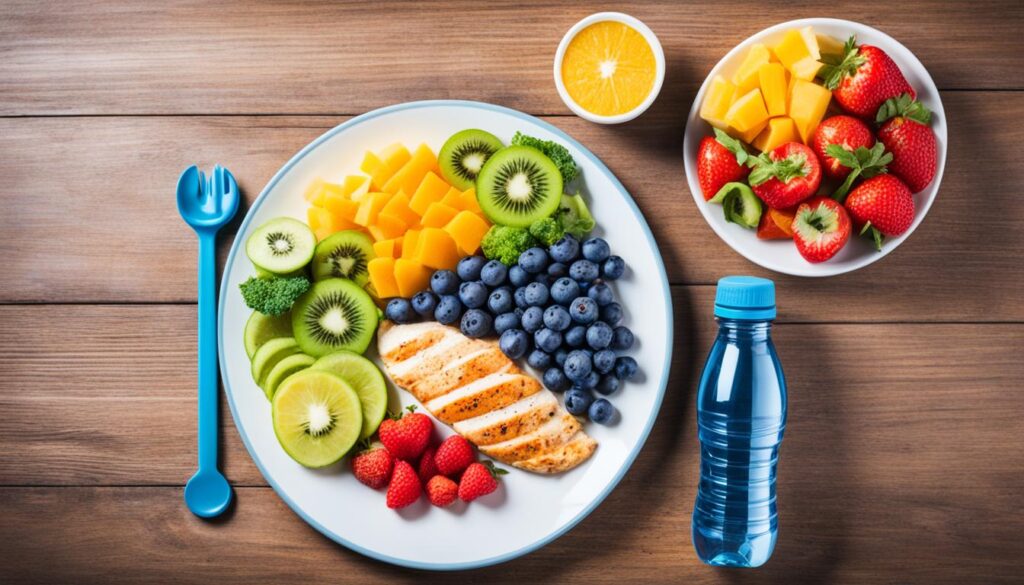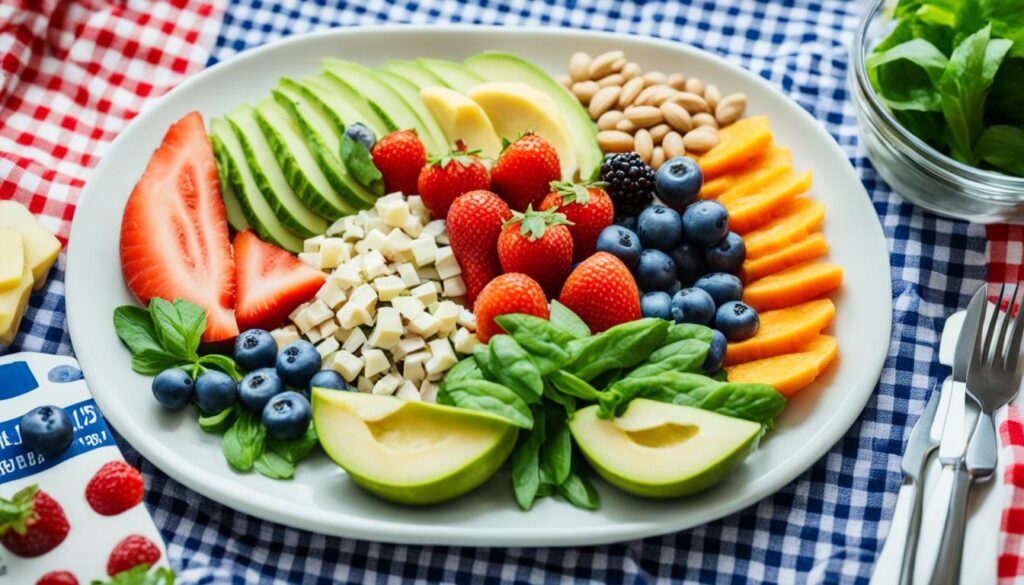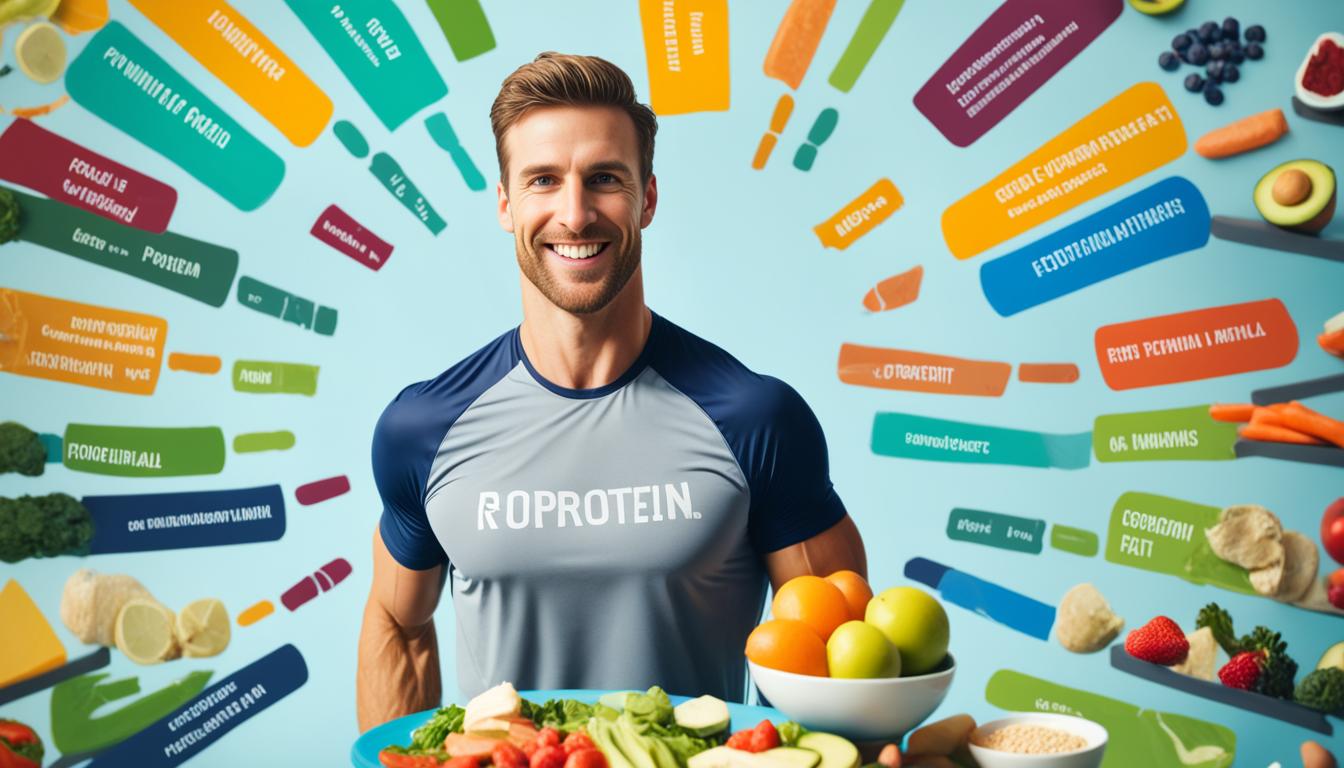The journey of a runner is defined by more than simply the miles they log each day; it’s surprisingly dictated by the complex biochemistry of their last meal. Did you know that a study in “Medicine & Science in Sports & Exercise” reported that runners could extend their endurance by an astonishing 20% simply by tweaking their diet? Yes, the road to triumph is paved with more than sweat—it’s built on the foundation of Nutritional Needs for Runners. This riveting fact underscores the significance of Healthy Eating for Runners, illustrating that success stems from both the pavement and the plate.
A deep-dive into the Basics of Nutrition for Runners reveals that running is as much a test of strategic eating as it is physical endurance. The optimal assemblage of carbohydrates, fats, and proteins can propel runners to new personal bests, while a nutritional misstep might diminish their hard-earned gains. Just like a high-performance engine requires premium fuel, a runner’s body demands a diet tailored to its energetic needs.
Embarking on the path of Running and Nutrition means unlocking the enigma of energy balance, while simultaneously maintaining the intricate machinery of the human body at peak performance. Let’s lace up and sprint into the fascinating nexus of fitness and food, where the right nutritional guidance is your ally in the relentless pursuit of running excellence.
Understanding the Runner’s Diet: More than Calories In and Out
Fueling for runners involves more than merely balancing calorie intake with the amount burned during exercise. The intricacies of sports nutrition for runners play an indispensable role in optimizing their energy levels, running performance, and recovery pathways. Let’s delve into the significance of macronutrients in a runner’s diet and the impact that glycogen stores and diet composition have on a runner’s overall vitality and ability to recover.
The Role of Macronutrients in Running Performance
Understanding the unique energy needs of runners starts with dissecting the role of macronutrients. Carbohydrates are not just fuel; they’re the premium grade octane that powers runners through miles. Proteins act as the essential building blocks, repairing micro-tears in muscle fibers caused by rigorous workouts. Meanwhile, fats are the diligent energy reserves, stepping in when carbohydrates are depleted during prolonged endurance challenges.
How Glycogen Stores Affect Your Energy Levels
Glycogen, the stored form of carbohydrate within the muscles and liver, stands as a runner’s quick-release energy source. As the intensity of a run escalates, the reliance on glycogen similarly increases. It’s this precious energy reserve that can make the difference between hitting the wall and breaking through it during a grueling run.
The Impact of Diet Composition on Running and Recovery
The composition of a runner’s plate reflects directly on their performance and post-run recovery. Timing the intake of a balance of carbs, proteins, and fats can lead to more efficient muscle recovery, reduced soreness, and better preparedness for the next run. Intelligent sports nutrition aligns closely with the timing of runs and is essential in maintaining hormonal balance and optimizing the body’s repair mechanisms.

| Nutrient | Role in Performance | Role in Recovery |
|---|---|---|
| Carbohydrates | Fuels high-intensity exercise; replenishes muscle glycogen | Restores glycogen reserves; reduces fatigue |
| Protein | Supports muscle repair during exercise | Facilitates muscle repair and rebuilding |
| Fats | Serves as a long-term energy source | Helps in reducing inflammatory responses post-run |
A compelling diet strategy supports the rhythmic feet of runners seeking to surpass personal thresholds. The blend of sports nutrition wisdom with practical dietary habits leads to uplifted energy levels in running and enriched recovery for runners. Your diet does more than satiate; it’s the silent coach guiding you through every stride and every restful moment towards your next personal best.
Nutrition for Runners: Fueling Before, During, and After Runs
Fueling the runner’s body is an art that blends science and personal preference to create the perfect palette of energy and endurance. In weaving the tapestry of training and performance, the threads of nutritional wisdom form a picture of health, vitality, and success. A strategic approach to Pre-Run Meals, Mid-Run Nutrition, and Post-Run Recovery sustains the ambitious pursuits of the dedicated runner, while adherence to Nutrition Tips for Runners forms the basis of a physically primed and performance-ready state.
Optimal Pre-Run Meals and Timing
The blueprint for a successful run starts hours before lacing up your shoes. The quintessential pre-run meal harmoniously combines quality carbohydrates with a touch of protein and healthy fats, ensuring the body has the energy required without digestive discomfort. Prioritizing low-fiber and low-fat foods minimizes gastrointestinal issues and fuels your run effectively.

- Oatmeal with banana and a dash of cinnamon
- Whole-grain toast with almond butter and honey
- Yogurt with mixed berries and a sprinkle of granola
Mid-Run Nutrition Strategies
During prolonged exertion, the mantra ‘keep it simple’ leads the way. A successful Mid-Run Nutrition plan focuses on easy-to-digest carbohydrates, coupled with electrolytes, to maintain energy levels and facilitate nerve transmission. Gels, chews, and isotonic sports drinks are favored choices for on-the-go refueling.
“Sustained performance requires that the well of energy keeps brimming – never let it run dry.”
| Product | Carbohydrates | Electrolytes |
|---|---|---|
| Energy Gel | 22g | Sodium, Potassium |
| Sports Drink | 14g per 8oz | Sodium, Potassium, Magnesium |
Effective Post-Run Recovery Foods
And just as the run wanes, the focus on Post-Run Recovery takes center stage. A precise choreography of carbohydrates rebuilds glycogen stores, whereas proteins spearhead muscle repair. This coordinated effort is essential to rebound with vigor, ready to conquer the next running challenge.
- Chocolate milk for its ideal carb-to-protein ratio
- Grilled chicken breast with quinoa and steamed vegetables
- Salmon with sweet potato and a side of greens
By incorporating these nutritional strategies, runners can navigate the path from pre-run preparation through to post-run rejuvenation, embracing each step with the strength and resilience that comes from optimal nourishment.
Carbohydrates: The Runner’s Power Source
Universally recognized as the best foods for runners, carbohydrates are the heavyweight champions when it comes to fueling the miles. The quick conversion of carbohydrates into glucose powers not only the muscles but also the brain, ensuring runners maintain a sharp mental edge. An optimal carbohydrate intake for runners is a fluid number that adjusts with the intensity and length of a workout, but a full glycogen store, typically requiring around 500g of carbohydrates, is essential for prolonged activity. Understanding the interdependence of glycogen stores and a runner’s energy source is key for both aspiring and seasoned athletes aiming for peak performance.

To navigate the myriad of carbohydrate sources, here’s a curated list of powerhouse options that can seamlessly integrate into any runner’s diet:
- Oats: A top-tier complex carbohydrate that provides a slow and steady release of energy.
- Bananas: Packed with potassium, these fruits are ideal for a pre-run boost or mid-run fuel.
- Sweet Potatoes: An excellent source of beta-carotene and fiber, they support long-term endurance.
- Whole Grain Bread: A versatile staple that pairs well with a variety of toppings for a balanced energy source.
- Pasta: The quintessential runner’s meal, providing ample carbs to replenish those glycogen stores.
When considering the vast landscape of carbohydrate options, remember to personalize your intake. Choose options that suit your digestive comfort, taste preferences, and performance needs. With carbohydrates as the lynchpin of a runner’s diet, strategizing intake around training routines will ensure energy levels are sustained, and the enjoyment of hitting the pavement lasts for many miles to come.
Protein and Fats: Building and Sustaining Muscle Health
For those dedicated to the rhythmic beat of their feet against the pavement, understanding the symbiotic relationship between proteins, healthy fats, and overall muscle health is essential. As runners push their limits, their muscles require the right nutritional support to heal and strengthen post-exertion, leading to enhanced endurance and performance.
Navigating Protein Needs for Muscle Repair
The role of protein for runners cannot be overstated. It is the cornerstone of muscle repair, aiding in the recovery of the microtears that occur during rigorous exercise. Athletes must pay close attention to their protein intake, ensuring they consume enough to support muscle regeneration, yet balanced enough to avoid unnecessary strain on the body.
Protein is not just a building block; it’s the architect that helps rebuild our muscles stronger after every run.
Optimal protein sources include lean meats, dairy, beans, and legumes, which provide not only the necessary amino acids but also fortify the body’s enzyme and hormonal functions.
Healthy Fats for Long-Term Energy
When discussing healthy fats in the diet, we’re looking at the marathon, not the sprint. Fats are a concentrated source of energy, vital when carbohydrate stores are depleted. Incorporating unsaturated fats from sources such as avocados, nuts, and olive oil contributes to sustained running energy.
These good fats aren’t just fuel; they are component parts of every cell membrane, instrumental in the overall health of a runner who demands a lot from their body.
To balance these macronutrients effectively, here’s a table that provides insights into optimal sources for both fats and proteins:
| Protein Source | Healthy Fat Source |
|---|---|
| Chicken Breast | Avocado |
| Salmon | Chia Seeds |
| Black Beans | Almonds |
| Quinoa | Extra Virgin Olive Oil |
| Eggs | Walnuts |
Understanding how to include muscle repair and endurance through calculated nutrition can elevate a runner’s prowess. The balance of proteins and fats is a veritable dance of synergistic energy, setting a tempo for repair, recovery, and the ultimate joy of sustained running freedom.
The Basics of Nutrition for Runners: Balancing Macros
For dedicated runners, balancing macronutrients is not merely a routine—it’s an essential strategy for optimizing endurance, speed, and overall performance. Each runner has unique nutritional needs for runners, which are defined by various factors including training intensity and personal health goals. Therefore, understanding the ideal macronutrient ratio for peak performance is pivotal.
What comes to mind when contemplating a runner’s plate? Is it overflowing with pasta, lean cuts of chicken, or perhaps avocados? The answer isn’t one-dimensional; in reality, it involves assessing and tailoring a diet balance for runners that maximizes their physical and mental functions. With a focus on the precision akin to a conductor orchestrating a symphony, runners harmonize their intake of carbohydrates, proteins, and fats to achieve what many consider the zenith of athletic nutrition.

- Carbohydrates serve as the powerhouse, providing the glycogen stores crucial for sustaining prolonged physical activity.
- Proteins play an instrumental role in repairing and strengthening muscle fibers damaged during rigorous training.
- Fats, often underestimated, are a vital source of energy, especially critical during long-distance runs.
While macronutrient needs can vary widely among individuals, a general guideline for a highly effective macro ratio is:
| Macronutrient | Percentage of Total Calories |
|---|---|
| Carbohydrates | 60-70% |
| Proteins | 15-20% |
| Fats | 15-20% |
With carbohydrates as the primary fuel, runners can maintain their vigor and push past their current thresholds. Simultaneously, proteins and fats should not be neglected as they are the crucial building blocks that support and maintain the body under the strain of consistent, intense exercise.
An elite runner’s plate is an artful balance of macronutrients, each measured and consumed with the intention of crossing the finish line—not just with speed but with strength and vitality.
Thus, the journey of a runner is as much about the kilometers clocked as it is about the nourishing sustenance they choose to fuel those miles. By balancing macronutrients, runners set the stage not only for the races of today but for a lifetime of healthy, joyous running adventures ahead.
Hydration and Electrolyte Balance for Runners
For runners, success is not just measured in miles or minutes but also in the meticulous maintenance of running hydration and electrolyte balance. Achieving the right equilibrium is paramount to both performance and overall well-being on the track. Let’s explore the signs that alert athletes to potential dehydration and the pivotal role electrolytes, particularly sodium, play in a runner’s physiological equilibrium.
Recognizing Signs of Dehydration
Vigilance against dehydration symptoms is a crucial aspect every runner should imbue in their regimen. Signs such as persistent thirst, darkened urine, lightheadedness, and rapid heart rate serve as the body’s plea for rehydration. Ignoring these warnings can swiftly escalate to reduced coordination and endurance, undermining not only performance but also health. Understanding these symptoms allows runners to proactively mitigate risks, ensuring that their hydration levels are replenished in alignment with the intensity and duration of their runs.
Importance of Sodium and Other Electrolytes in Performance
Striking a harmonious electrolyte balance is instrumental for runners, with sodium intake for runners being particularly critical. This electrolyte aids in fluid balance and nerve transmission. However, sodium loss through sweat must be counterbalanced to avert muscle cramps, dizziness, and cognitive impairment. Runners must find a sodium intake that dovetails with their sweating rate, intensity of exercise, and climatic conditions.
- Maintain frequent hydration, especially before and after runs.
- Incorporate a balanced electrolyte-rich diet or supplements as necessary.
- Customize electrolyte intake, particularly sodium, according to individual needs.
- Monitor urine color and mental clarity to stay ahead of dehydration.
| Electrolyte | Function | Recommended Sources |
|---|---|---|
| Sodium | Regulates fluid balance, nerve function | Sports drinks, table salt, pretzels |
| Potassium | Prevents muscle cramps, maintains cellular function | Bananas, potatoes, oranges |
| Calcium | Essential for muscle contractions and bone strength | Dairy products, fortified plant milk, leafy greens |
| Magnesium | Supports muscle relaxation, energy production | Nuts, seeds, whole grains |
By fine-tuning their hydration and electrolyte strategies, runners can foster a state of physical readiness that propels them across finish lines and toward their personal bests with vigor and resilience.
Vitamins and Minerals: Essential Pieces of the Nutrition Puzzle
As runners push their bodies to new limits, it’s crucial to understand that beyond macronutrients, running vitamins and minerals form the building blocks of a strong, resilient athlete. These micronutrients work silently yet powerfully to sustain the physiological demands of running and are vital for both performance enhancement and long-term well-being.
Calcium and Vitamin D for Bone Health
Runners know the importance of strong bones, and acknowledging the role of calcium and vitamin D in maintaining bone health for runners cannot be overstated. Calcium fortifies the skeletal system, while Vitamin D enhances calcium absorption, synergistically preventing the risk of stress fractures— a runner’s bane. Natural sunlight exposure, fortified dairy products, and nutrient-dense fatty fish are excellent sources to harness these essential nutrients.
Iron’s Crucial Role in Oxygen Delivery
Iron is the core element in hemoglobin, which is responsible for oxygen delivery to muscles during a run. An adequate iron intake is thus pivotal and directly impacts a runner’s endurance and performance. To elevate iron absorption, coupling iron-rich foods like lean meats and spinach with vitamin C sources, such as citrus fruits, is a strategic nutritional move for every enduring runner.
With a diet rich in these crucial vitamins and minerals, runners not only keep their engines running at peak performance but also lay down the tracks for a journey filled with health, agility, and fewer injuries. Iron for endurance sports is not just a recommendation; it’s a necessity that, when heeded, pays off in robust health and invincible performance.
Special Dietary Considerations for Runner Performance
As athletes deeply invested in the realm of endurance sports, runners often encounter the challenge of balancing their nutrition with individual sensitivities and the intense demands of their training schedules. Recognizing and addressing Food Sensitivities in Runners and Gastrointestinal Distress are paramount for consistent performance. Meanwhile, the exploration of Different Training Fueling Strategies provides a framework for athletes to make necessary Dietary Adjustments for Runners, ensuring each individual’s regimen supports both their health and sportive ambitions effectively.
Navigating Food Sensitivities and Gastrointestinal Distress
Identifying and mitigating food sensitivities is a crucial step towards optimizing a runner’s performance. When strategizing meal plans, it is imperative to discern and eliminate foods that may cause gastrointestinal discomfort, as such disruptions can critically impair both training and competitive performance. For many, a low-FODMAP diet or gluten-free options have been transformative in managing symptoms and enhancing overall well-being.
An integral aspect of combating gastrointestinal issues is hydration. Sufficient fluid intake, paired with a balanced electrolyte profile, can mitigate potential digestive disturbances during extended periods of exertion. Runners should aim to personalize their hydration strategy, taking into account personal sweat rates, the climate, and their body’s unique response to different hydration sources.
Fueling Strategies for Different Types of Training
Training duration and intensity dictate the nutritional approach a runner should employ. For instance, readily available carbohydrates like fruit or energy gels may be advantageous for quick energy during high-intensity interval workouts, whereas complex carbohydrates are preferable for sustained energy in longer training sessions. Tracking physiological responses to various foods can guide runners in developing a fueling plan that aligns with their training demands while minimizing adverse reactions.
- Fueling with a focus on simplicity and digestive comfort during long runs.
- Incorporating a blend of proteins, fats, and carbohydrates for balanced recovery meals.
- Experimenting with meal timing to optimize energy levels and minimize digestive discomfort.
By tailoring dietary habits to respond to the intricate demands of their sport, runners can elevate their performance, minimize health impediments, and achieve new personal bests.
Conclusion
In the realm of long-distance running, the synergy between stride and sustenance is undeniable. A Comprehensive Runner’s Diet is not merely a fueling protocol—it’s a blueprint for thriving on and off the track. Effective Nutrition for Runners transcends the rudimentary act of eating for energy; it involves a sophisticated approach to macro and micronutrient intake, expertly engineered for each phase of a runner’s journey. From the rigors of training to the triumph of race day, nutrition is the unheralded coach, the quiet architect of endurance and strength.
Embarking on a path toward Running Performance Enhancement requires more than just training regimens and willpower. It demands nutritional literacy—a deep dive into the science of sustenance and a steadfast commitment to Sustainable Nutritional Practices. Runners who embrace this holistic approach to their diet witness transformative results; a finely-tuned metabolism, hastened recovery timelines, and elevated overall health. Indeed, the alchemy of athlete nutrition is both a discipline and an art, crafting the very engines that drive runners towards their personal bests.
The marathon of mastering runner nutrition is a continuous exploration, one where the fuel of today informs the fortitude of tomorrow. As runners traverse this scenic sojourn, every meal becomes a mile marker of progress, each snack a stepping stone to success. For those who lace up with intention and dine with deliberation, the finish line is not a destination—it’s a testament to the marriage of motion and meal, a resounding affirmation that every step, every sprint, is powered by the potent force of an adept and attentive diet.


2 Comments
Submit a Comment